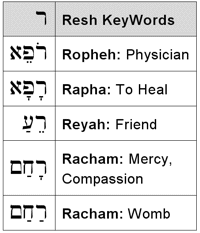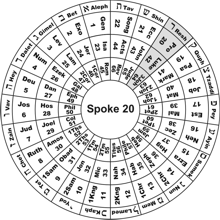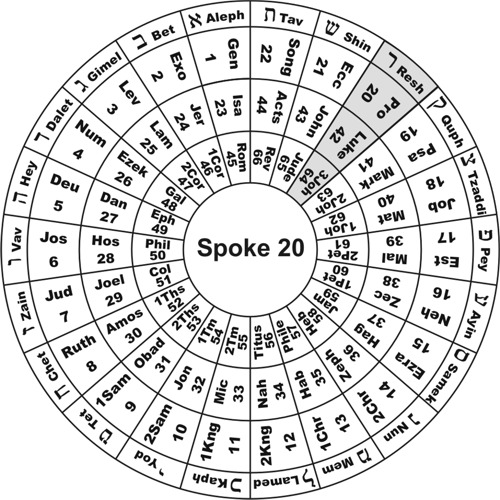Spoke 20 - Resh - Luke: Tender Mercies of the Great Physician
To perform the mercy promised to our fathers, and to
remember his holy covenant; The oath which he sware to our father Abraham ... And thou,
child, shalt be called the prophet of the Highest: for thou shalt go before the face of the
Lord to prepare his ways; To give knowledge of salvation unto his people by the remission of
their sins, Through the tender mercy of our God; whereby the dayspring from on
high hath visited us, To give light to them that sit in darkness and in the shadow of death ...
Luke 1:76ff (Spoke 20, Cycle 2)
 The
entire tone and most of the themes of Luke's Gospel can be summed up in the Resh KeyWords listed in the table.
The meaning of the KeyWord racham (mercy) figures prominently in Luke's first chapter.
God used it in one of His Alphabetic Verses: The
entire tone and most of the themes of Luke's Gospel can be summed up in the Resh KeyWords listed in the table.
The meaning of the KeyWord racham (mercy) figures prominently in Luke's first chapter.
God used it in one of His Alphabetic Verses:
- Great are thy tender mercies (racham), O LORD: quicken me according to thy judgments. AV Ps 119:156
Luke is the only Gospel writer that uses either of the phrases tender mercy or great mercy.
This touches a primary characteristics of his book, as noted, for example, by
Johann Peter Lange who defined its theme as "the revelation of divine mercy" in his
Das Leben Jesu (The Life of Jesus, 3 vols. 1844-1847). This is the endless wonder of the Wheel;
the plain and obvious themes of the Books, as noted by countless scholars over the span of centuries,
consistently track with the Alphabetic KeyWords!
The KeyWord racham carries very gentle and sympathetic overtones. It is truly a
primary key to the Book of Luke. Strong’s Concordance defines it as to love deeply,
to have mercy, to be compassionate, to have tender affection. These ideas dominate
Luke's Book which presents the Divine tenderness of Christ in ways seen nowhere else.
The theme of mercy is explicit in Zechariah's praise of God above (the Benedictus, vss 1:72, 77),
and is mentioned twice in Mary's praise of God her Saviour (the Magnificat):
For he that is mighty hath done to me great things; and holy is his name.
And his mercy is on them that fear him from generation to generation. ...
He hath helped his servant Israel, in remembrance of his mercy; As he
spake to our fathers, to Abraham, and to his seed for ever.
Luke 1:49,54 (Spoke 20, Cycle 2)
And we see it again when Elizabeth brought forth her son, John the Baptist:
And her neighbours and her cousins heard how the Lord had shewed great mercy upon her;
and they rejoiced with her.
Luke 1:58 (Spoke 20, Cycle 2)
This interweaves with Luke's strong emphasis on friends and neighbours,
which also distinguishes his Gospel from the other three. This is based to the Resh KeyWord reyah.
All of these "mercy" passages are unique to Luke, and this theme is evident even when
he does not use the word mercy itself, as in the parable the Good Samaritan where the stranger cared for
the wounded traveler (see Luke: The Proverbial Gospel). And now that we have come so far around the Wheel, we can easily see how
pervasive and consistent these alphabetically correlated themes really are on each Spoke.
Consider these parallel verses:
Matthew (Spoke 18, Tzaddi)
– Righteousness and Perfection – |
Luke (Spoke 20, Resh)
– Kindness and Mercy – |
| [5:44] But I say unto you, Love your enemies, bless them that curse you,
do good to them that hate you, and pray for them which despitefully use you,
and persecute you; That ye may be the children of your Father which is in heaven:
for he maketh his sun to rise on the evil and on the good, and sendeth rain on the
just and on the unjust.
|
[6:35] But love ye your enemies, and do good, and lend, hoping for nothing again;
and your reward shall be great, and ye shall be the children of the Highest:
for he is kind unto the unthankful and to the evil.
|
| [5:48] Be ye therefore perfect, even as your Father which is in heaven is perfect.
|
[6:36] Be ye therefore merciful, as your Father also is merciful.
|
Just look at this! Matthew specifically links to the Tzaddi KeyWord tzedek (righteous/just)
and speaks of perfection while Luke speaks of God's kindness and mercy, the latter being linked to the
Resh KeyWord racham. The patterns are completely consistent across the Spokes!
Compare the distinct emotional tone of each Letter; the sharp Tzaddi with its KeyWords tzavah and tzey
(command and go forth, BW book pg 324) versus the soft Resh with its KeyWords
reyah and racham (friend and mercy)! Their
meanings are integrated with their sounds. There simply is no end to the glory of what God has revealed here!
|



